HUM200 Cultural Artifacts Essay
VerifiedAdded on 2019/09/18
|7
|1263
|351
Essay
AI Summary
This essay, submitted for HUM200, analyzes cultural artifacts related to music and art. It examines the act of composition across various musical genres, highlighting the role of notation and lead sheets. The essay explores the theme of patriotism in art and music, drawing on personal experiences and referencing historical context, including the Harlem Renaissance. It discusses the subjective nature of musical experience and the challenges of translating musical phenomena into words. The author aims to connect the explored themes to a broader audience interested in national identity and artistic expression, suggesting ways to make the presentation more relatable and understandable.
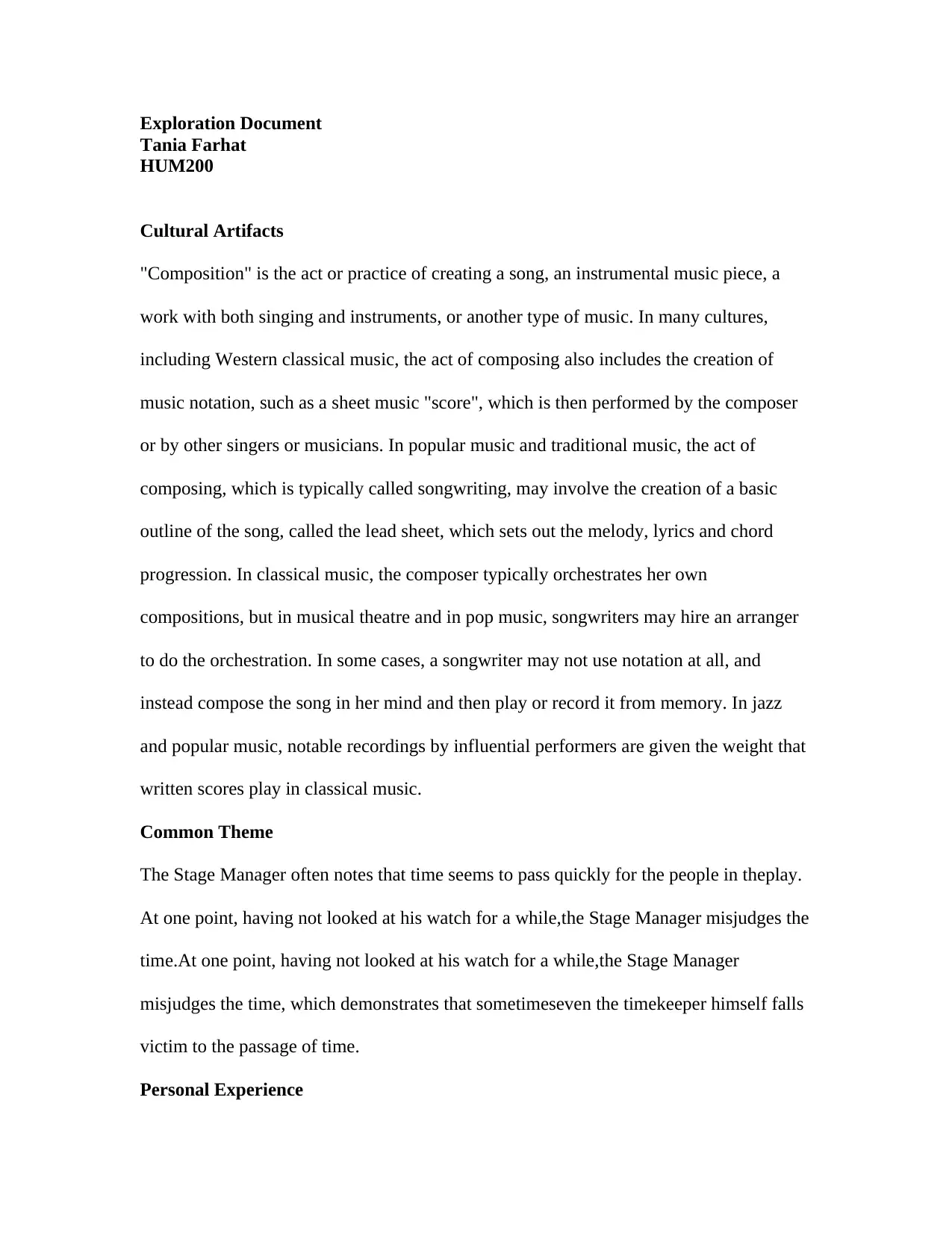
Exploration Document
Tania Farhat
HUM200
Cultural Artifacts
"Composition" is the act or practice of creating a song, an instrumental music piece, a
work with both singing and instruments, or another type of music. In many cultures,
including Western classical music, the act of composing also includes the creation of
music notation, such as a sheet music "score", which is then performed by the composer
or by other singers or musicians. In popular music and traditional music, the act of
composing, which is typically called songwriting, may involve the creation of a basic
outline of the song, called the lead sheet, which sets out the melody, lyrics and chord
progression. In classical music, the composer typically orchestrates her own
compositions, but in musical theatre and in pop music, songwriters may hire an arranger
to do the orchestration. In some cases, a songwriter may not use notation at all, and
instead compose the song in her mind and then play or record it from memory. In jazz
and popular music, notable recordings by influential performers are given the weight that
written scores play in classical music.
Common Theme
The Stage Manager often notes that time seems to pass quickly for the people in theplay.
At one point, having not looked at his watch for a while,the Stage Manager misjudges the
time.At one point, having not looked at his watch for a while,the Stage Manager
misjudges the time, which demonstrates that sometimeseven the timekeeper himself falls
victim to the passage of time.
Personal Experience
Tania Farhat
HUM200
Cultural Artifacts
"Composition" is the act or practice of creating a song, an instrumental music piece, a
work with both singing and instruments, or another type of music. In many cultures,
including Western classical music, the act of composing also includes the creation of
music notation, such as a sheet music "score", which is then performed by the composer
or by other singers or musicians. In popular music and traditional music, the act of
composing, which is typically called songwriting, may involve the creation of a basic
outline of the song, called the lead sheet, which sets out the melody, lyrics and chord
progression. In classical music, the composer typically orchestrates her own
compositions, but in musical theatre and in pop music, songwriters may hire an arranger
to do the orchestration. In some cases, a songwriter may not use notation at all, and
instead compose the song in her mind and then play or record it from memory. In jazz
and popular music, notable recordings by influential performers are given the weight that
written scores play in classical music.
Common Theme
The Stage Manager often notes that time seems to pass quickly for the people in theplay.
At one point, having not looked at his watch for a while,the Stage Manager misjudges the
time.At one point, having not looked at his watch for a while,the Stage Manager
misjudges the time, which demonstrates that sometimeseven the timekeeper himself falls
victim to the passage of time.
Personal Experience
Paraphrase This Document
Need a fresh take? Get an instant paraphrase of this document with our AI Paraphraser
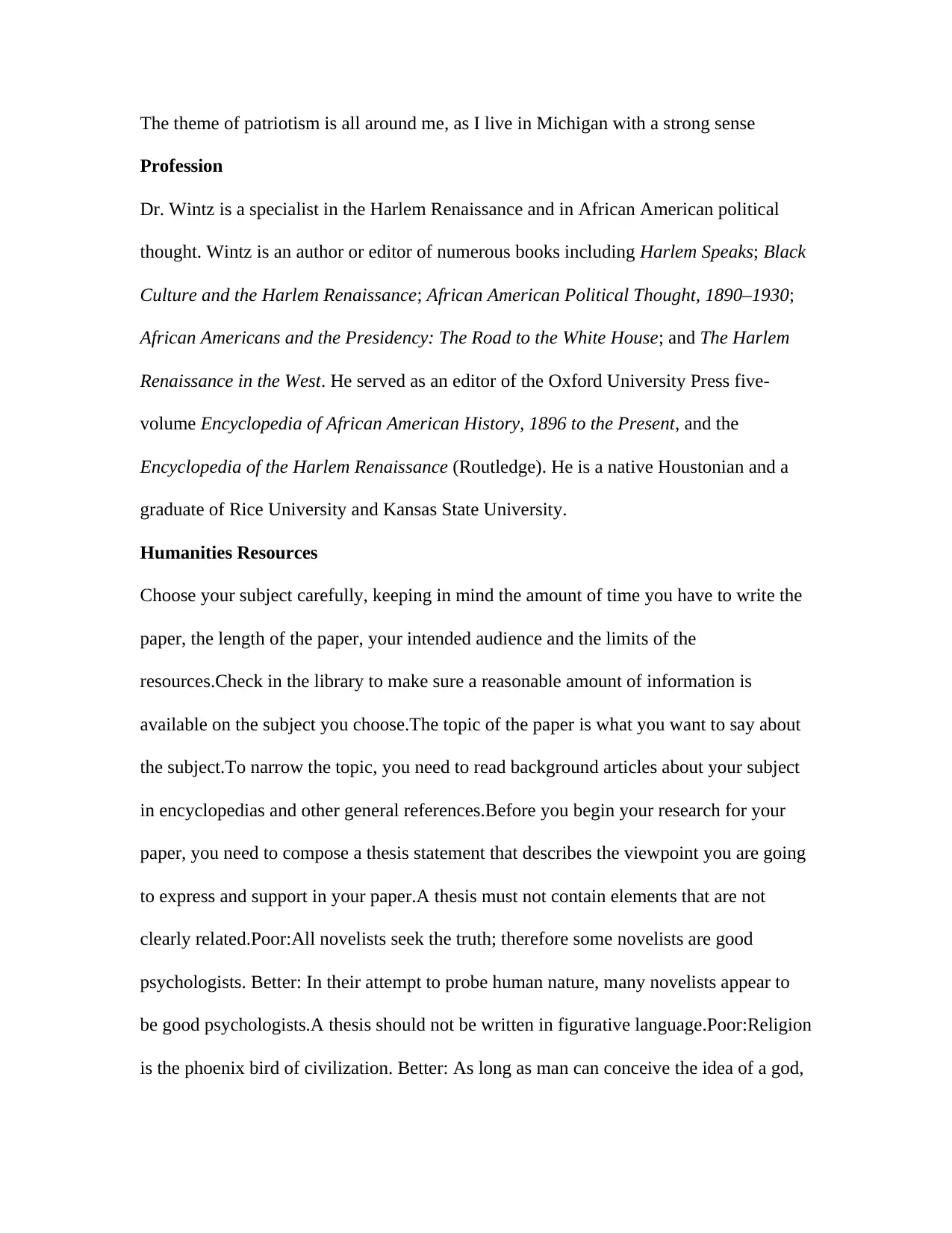
The theme of patriotism is all around me, as I live in Michigan with a strong sense
Profession
Dr. Wintz is a specialist in the Harlem Renaissance and in African American political
thought. Wintz is an author or editor of numerous books including Harlem Speaks; Black
Culture and the Harlem Renaissance; African American Political Thought, 1890–1930;
African Americans and the Presidency: The Road to the White House; and The Harlem
Renaissance in the West. He served as an editor of the Oxford University Press five-
volume Encyclopedia of African American History, 1896 to the Present, and the
Encyclopedia of the Harlem Renaissance (Routledge). He is a native Houstonian and a
graduate of Rice University and Kansas State University.
Humanities Resources
Choose your subject carefully, keeping in mind the amount of time you have to write the
paper, the length of the paper, your intended audience and the limits of the
resources.Check in the library to make sure a reasonable amount of information is
available on the subject you choose.The topic of the paper is what you want to say about
the subject.To narrow the topic, you need to read background articles about your subject
in encyclopedias and other general references.Before you begin your research for your
paper, you need to compose a thesis statement that describes the viewpoint you are going
to express and support in your paper.A thesis must not contain elements that are not
clearly related.Poor:All novelists seek the truth; therefore some novelists are good
psychologists. Better: In their attempt to probe human nature, many novelists appear to
be good psychologists.A thesis should not be written in figurative language.Poor:Religion
is the phoenix bird of civilization. Better: As long as man can conceive the idea of a god,
Profession
Dr. Wintz is a specialist in the Harlem Renaissance and in African American political
thought. Wintz is an author or editor of numerous books including Harlem Speaks; Black
Culture and the Harlem Renaissance; African American Political Thought, 1890–1930;
African Americans and the Presidency: The Road to the White House; and The Harlem
Renaissance in the West. He served as an editor of the Oxford University Press five-
volume Encyclopedia of African American History, 1896 to the Present, and the
Encyclopedia of the Harlem Renaissance (Routledge). He is a native Houstonian and a
graduate of Rice University and Kansas State University.
Humanities Resources
Choose your subject carefully, keeping in mind the amount of time you have to write the
paper, the length of the paper, your intended audience and the limits of the
resources.Check in the library to make sure a reasonable amount of information is
available on the subject you choose.The topic of the paper is what you want to say about
the subject.To narrow the topic, you need to read background articles about your subject
in encyclopedias and other general references.Before you begin your research for your
paper, you need to compose a thesis statement that describes the viewpoint you are going
to express and support in your paper.A thesis must not contain elements that are not
clearly related.Poor:All novelists seek the truth; therefore some novelists are good
psychologists. Better: In their attempt to probe human nature, many novelists appear to
be good psychologists.A thesis should not be written in figurative language.Poor:Religion
is the phoenix bird of civilization. Better: As long as man can conceive the idea of a god,
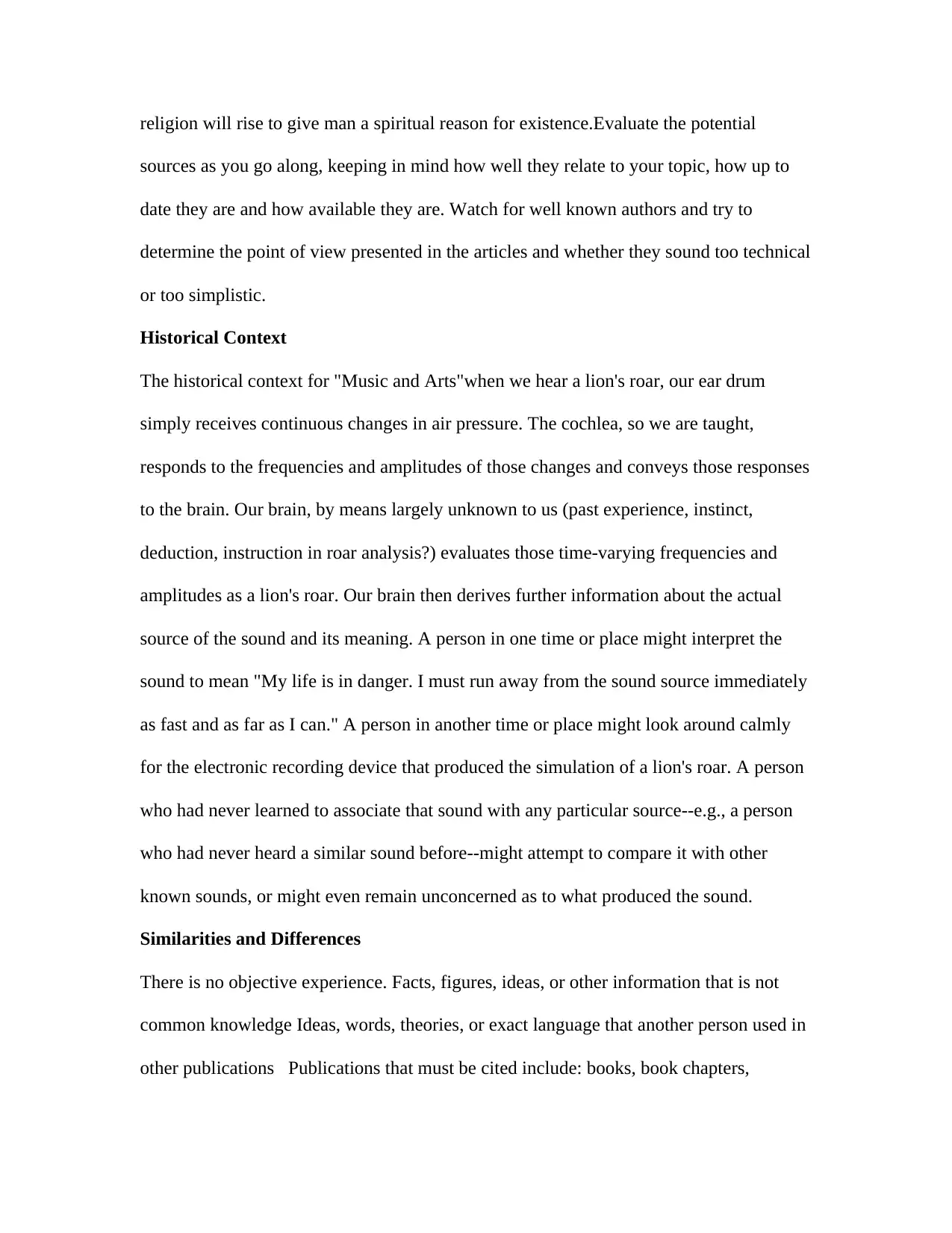
religion will rise to give man a spiritual reason for existence.Evaluate the potential
sources as you go along, keeping in mind how well they relate to your topic, how up to
date they are and how available they are. Watch for well known authors and try to
determine the point of view presented in the articles and whether they sound too technical
or too simplistic.
Historical Context
The historical context for "Music and Arts"when we hear a lion's roar, our ear drum
simply receives continuous changes in air pressure. The cochlea, so we are taught,
responds to the frequencies and amplitudes of those changes and conveys those responses
to the brain. Our brain, by means largely unknown to us (past experience, instinct,
deduction, instruction in roar analysis?) evaluates those time-varying frequencies and
amplitudes as a lion's roar. Our brain then derives further information about the actual
source of the sound and its meaning. A person in one time or place might interpret the
sound to mean "My life is in danger. I must run away from the sound source immediately
as fast and as far as I can." A person in another time or place might look around calmly
for the electronic recording device that produced the simulation of a lion's roar. A person
who had never learned to associate that sound with any particular source--e.g., a person
who had never heard a similar sound before--might attempt to compare it with other
known sounds, or might even remain unconcerned as to what produced the sound.
Similarities and Differences
There is no objective experience. Facts, figures, ideas, or other information that is not
common knowledge Ideas, words, theories, or exact language that another person used in
other publications Publications that must be cited include: books, book chapters,
sources as you go along, keeping in mind how well they relate to your topic, how up to
date they are and how available they are. Watch for well known authors and try to
determine the point of view presented in the articles and whether they sound too technical
or too simplistic.
Historical Context
The historical context for "Music and Arts"when we hear a lion's roar, our ear drum
simply receives continuous changes in air pressure. The cochlea, so we are taught,
responds to the frequencies and amplitudes of those changes and conveys those responses
to the brain. Our brain, by means largely unknown to us (past experience, instinct,
deduction, instruction in roar analysis?) evaluates those time-varying frequencies and
amplitudes as a lion's roar. Our brain then derives further information about the actual
source of the sound and its meaning. A person in one time or place might interpret the
sound to mean "My life is in danger. I must run away from the sound source immediately
as fast and as far as I can." A person in another time or place might look around calmly
for the electronic recording device that produced the simulation of a lion's roar. A person
who had never learned to associate that sound with any particular source--e.g., a person
who had never heard a similar sound before--might attempt to compare it with other
known sounds, or might even remain unconcerned as to what produced the sound.
Similarities and Differences
There is no objective experience. Facts, figures, ideas, or other information that is not
common knowledge Ideas, words, theories, or exact language that another person used in
other publications Publications that must be cited include: books, book chapters,
⊘ This is a preview!⊘
Do you want full access?
Subscribe today to unlock all pages.

Trusted by 1+ million students worldwide
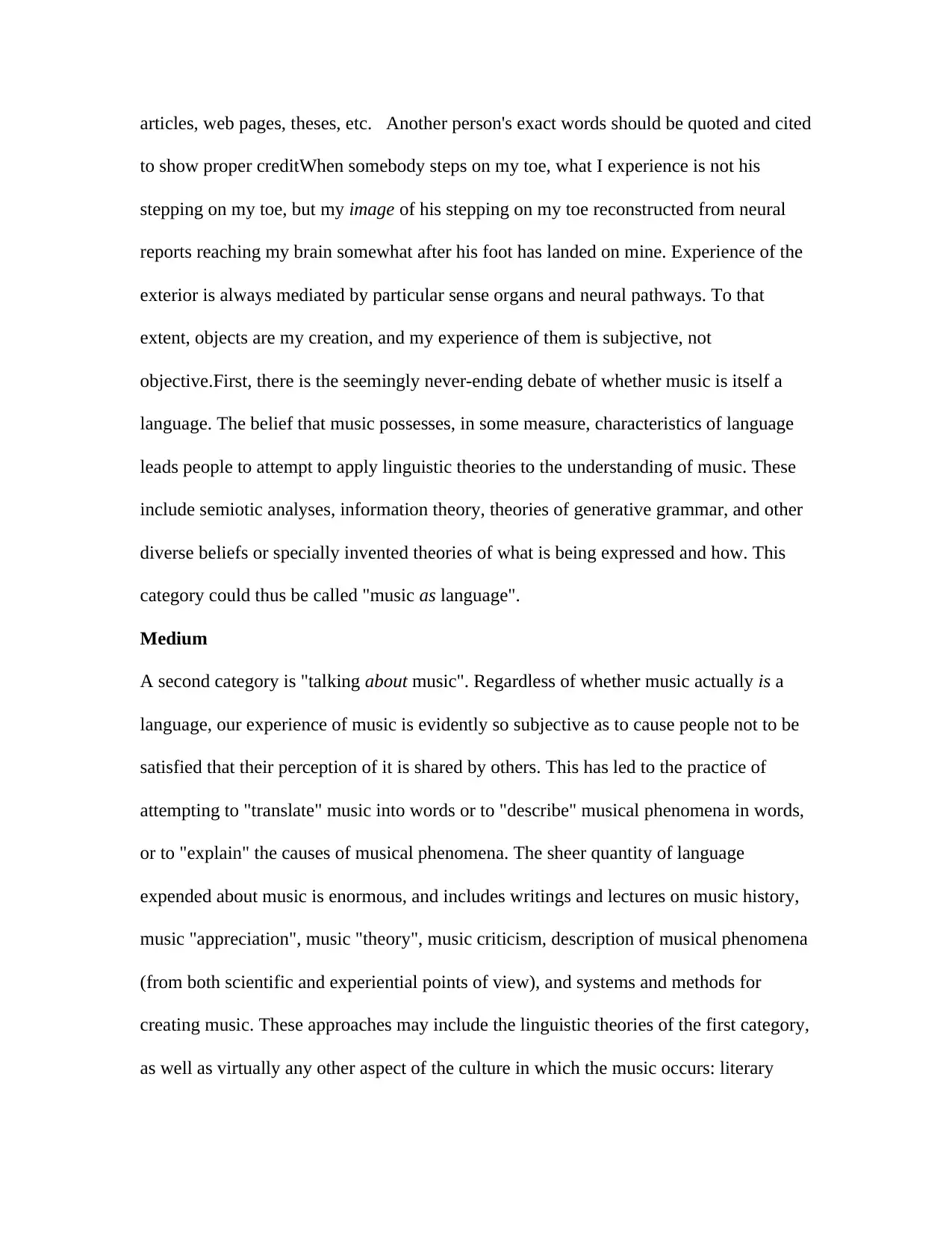
articles, web pages, theses, etc. Another person's exact words should be quoted and cited
to show proper creditWhen somebody steps on my toe, what I experience is not his
stepping on my toe, but my image of his stepping on my toe reconstructed from neural
reports reaching my brain somewhat after his foot has landed on mine. Experience of the
exterior is always mediated by particular sense organs and neural pathways. To that
extent, objects are my creation, and my experience of them is subjective, not
objective.First, there is the seemingly never-ending debate of whether music is itself a
language. The belief that music possesses, in some measure, characteristics of language
leads people to attempt to apply linguistic theories to the understanding of music. These
include semiotic analyses, information theory, theories of generative grammar, and other
diverse beliefs or specially invented theories of what is being expressed and how. This
category could thus be called "music as language".
Medium
A second category is "talking about music". Regardless of whether music actually is a
language, our experience of music is evidently so subjective as to cause people not to be
satisfied that their perception of it is shared by others. This has led to the practice of
attempting to "translate" music into words or to "describe" musical phenomena in words,
or to "explain" the causes of musical phenomena. The sheer quantity of language
expended about music is enormous, and includes writings and lectures on music history,
music "appreciation", music "theory", music criticism, description of musical phenomena
(from both scientific and experiential points of view), and systems and methods for
creating music. These approaches may include the linguistic theories of the first category,
as well as virtually any other aspect of the culture in which the music occurs: literary
to show proper creditWhen somebody steps on my toe, what I experience is not his
stepping on my toe, but my image of his stepping on my toe reconstructed from neural
reports reaching my brain somewhat after his foot has landed on mine. Experience of the
exterior is always mediated by particular sense organs and neural pathways. To that
extent, objects are my creation, and my experience of them is subjective, not
objective.First, there is the seemingly never-ending debate of whether music is itself a
language. The belief that music possesses, in some measure, characteristics of language
leads people to attempt to apply linguistic theories to the understanding of music. These
include semiotic analyses, information theory, theories of generative grammar, and other
diverse beliefs or specially invented theories of what is being expressed and how. This
category could thus be called "music as language".
Medium
A second category is "talking about music". Regardless of whether music actually is a
language, our experience of music is evidently so subjective as to cause people not to be
satisfied that their perception of it is shared by others. This has led to the practice of
attempting to "translate" music into words or to "describe" musical phenomena in words,
or to "explain" the causes of musical phenomena. The sheer quantity of language
expended about music is enormous, and includes writings and lectures on music history,
music "appreciation", music "theory", music criticism, description of musical phenomena
(from both scientific and experiential points of view), and systems and methods for
creating music. These approaches may include the linguistic theories of the first category,
as well as virtually any other aspect of the culture in which the music occurs: literary
Paraphrase This Document
Need a fresh take? Get an instant paraphrase of this document with our AI Paraphraser
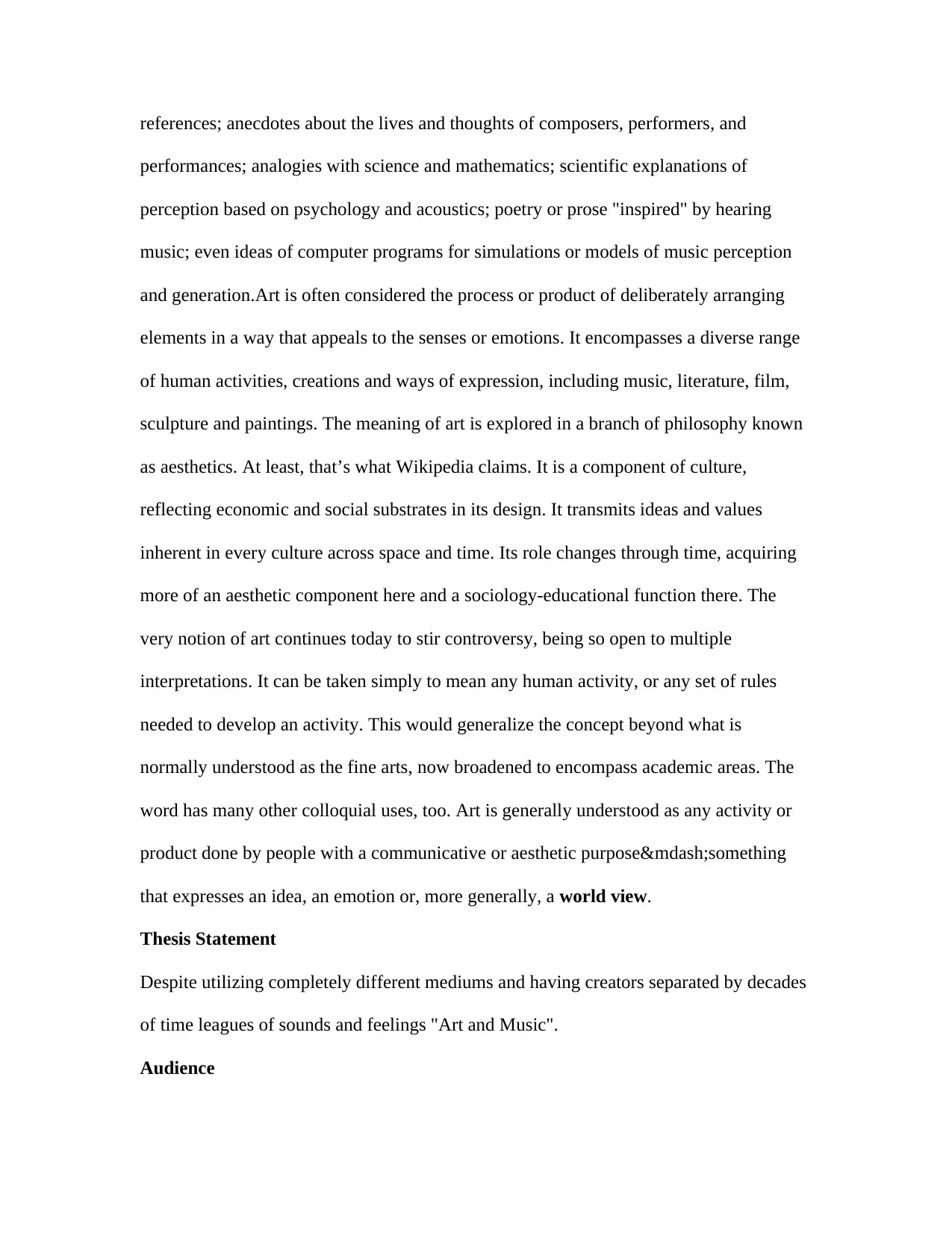
references; anecdotes about the lives and thoughts of composers, performers, and
performances; analogies with science and mathematics; scientific explanations of
perception based on psychology and acoustics; poetry or prose "inspired" by hearing
music; even ideas of computer programs for simulations or models of music perception
and generation.Art is often considered the process or product of deliberately arranging
elements in a way that appeals to the senses or emotions. It encompasses a diverse range
of human activities, creations and ways of expression, including music, literature, film,
sculpture and paintings. The meaning of art is explored in a branch of philosophy known
as aesthetics. At least, that’s what Wikipedia claims. It is a component of culture,
reflecting economic and social substrates in its design. It transmits ideas and values
inherent in every culture across space and time. Its role changes through time, acquiring
more of an aesthetic component here and a sociology-educational function there. The
very notion of art continues today to stir controversy, being so open to multiple
interpretations. It can be taken simply to mean any human activity, or any set of rules
needed to develop an activity. This would generalize the concept beyond what is
normally understood as the fine arts, now broadened to encompass academic areas. The
word has many other colloquial uses, too. Art is generally understood as any activity or
product done by people with a communicative or aesthetic purpose—something
that expresses an idea, an emotion or, more generally, a world view.
Thesis Statement
Despite utilizing completely different mediums and having creators separated by decades
of time leagues of sounds and feelings "Art and Music".
Audience
performances; analogies with science and mathematics; scientific explanations of
perception based on psychology and acoustics; poetry or prose "inspired" by hearing
music; even ideas of computer programs for simulations or models of music perception
and generation.Art is often considered the process or product of deliberately arranging
elements in a way that appeals to the senses or emotions. It encompasses a diverse range
of human activities, creations and ways of expression, including music, literature, film,
sculpture and paintings. The meaning of art is explored in a branch of philosophy known
as aesthetics. At least, that’s what Wikipedia claims. It is a component of culture,
reflecting economic and social substrates in its design. It transmits ideas and values
inherent in every culture across space and time. Its role changes through time, acquiring
more of an aesthetic component here and a sociology-educational function there. The
very notion of art continues today to stir controversy, being so open to multiple
interpretations. It can be taken simply to mean any human activity, or any set of rules
needed to develop an activity. This would generalize the concept beyond what is
normally understood as the fine arts, now broadened to encompass academic areas. The
word has many other colloquial uses, too. Art is generally understood as any activity or
product done by people with a communicative or aesthetic purpose—something
that expresses an idea, an emotion or, more generally, a world view.
Thesis Statement
Despite utilizing completely different mediums and having creators separated by decades
of time leagues of sounds and feelings "Art and Music".
Audience
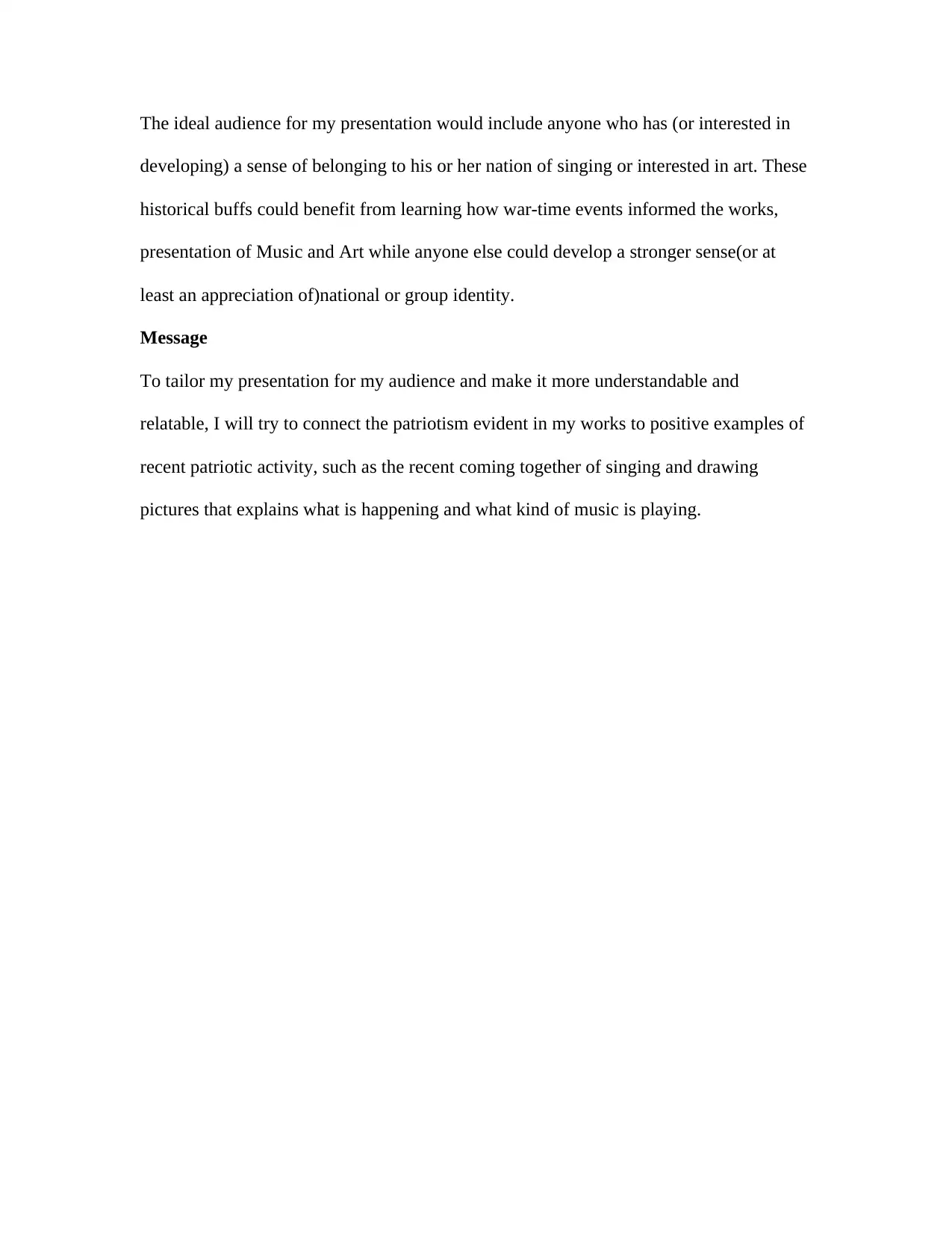
The ideal audience for my presentation would include anyone who has (or interested in
developing) a sense of belonging to his or her nation of singing or interested in art. These
historical buffs could benefit from learning how war-time events informed the works,
presentation of Music and Art while anyone else could develop a stronger sense(or at
least an appreciation of)national or group identity.
Message
To tailor my presentation for my audience and make it more understandable and
relatable, I will try to connect the patriotism evident in my works to positive examples of
recent patriotic activity, such as the recent coming together of singing and drawing
pictures that explains what is happening and what kind of music is playing.
developing) a sense of belonging to his or her nation of singing or interested in art. These
historical buffs could benefit from learning how war-time events informed the works,
presentation of Music and Art while anyone else could develop a stronger sense(or at
least an appreciation of)national or group identity.
Message
To tailor my presentation for my audience and make it more understandable and
relatable, I will try to connect the patriotism evident in my works to positive examples of
recent patriotic activity, such as the recent coming together of singing and drawing
pictures that explains what is happening and what kind of music is playing.
⊘ This is a preview!⊘
Do you want full access?
Subscribe today to unlock all pages.

Trusted by 1+ million students worldwide
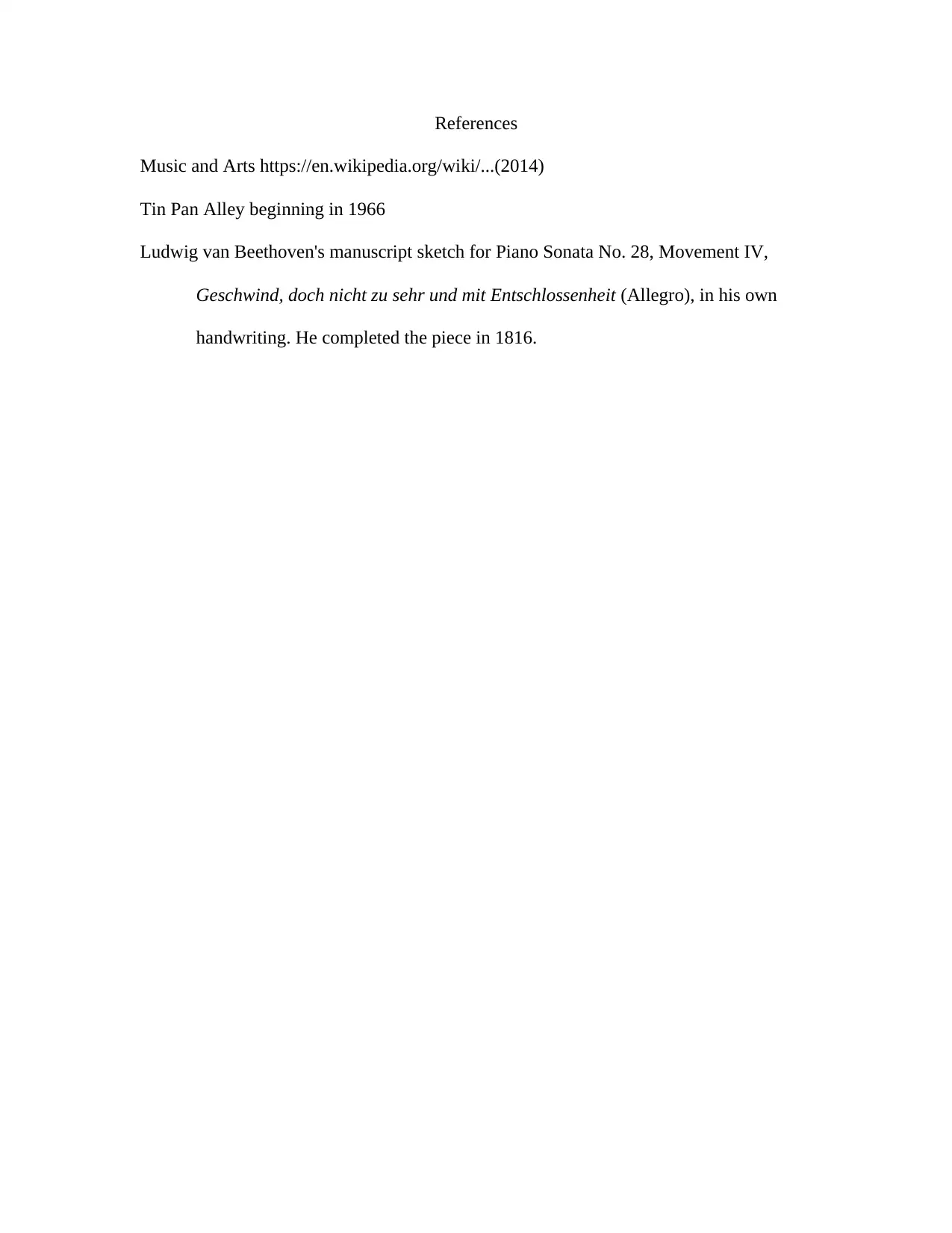
References
Music and Arts https://en.wikipedia.org/wiki/...(2014)
Tin Pan Alley beginning in 1966
Ludwig van Beethoven's manuscript sketch for Piano Sonata No. 28, Movement IV,
Geschwind, doch nicht zu sehr und mit Entschlossenheit (Allegro), in his own
handwriting. He completed the piece in 1816.
Music and Arts https://en.wikipedia.org/wiki/...(2014)
Tin Pan Alley beginning in 1966
Ludwig van Beethoven's manuscript sketch for Piano Sonata No. 28, Movement IV,
Geschwind, doch nicht zu sehr und mit Entschlossenheit (Allegro), in his own
handwriting. He completed the piece in 1816.
1 out of 7
Related Documents
Your All-in-One AI-Powered Toolkit for Academic Success.
+13062052269
info@desklib.com
Available 24*7 on WhatsApp / Email
![[object Object]](/_next/static/media/star-bottom.7253800d.svg)
Unlock your academic potential
Copyright © 2020–2026 A2Z Services. All Rights Reserved. Developed and managed by ZUCOL.
